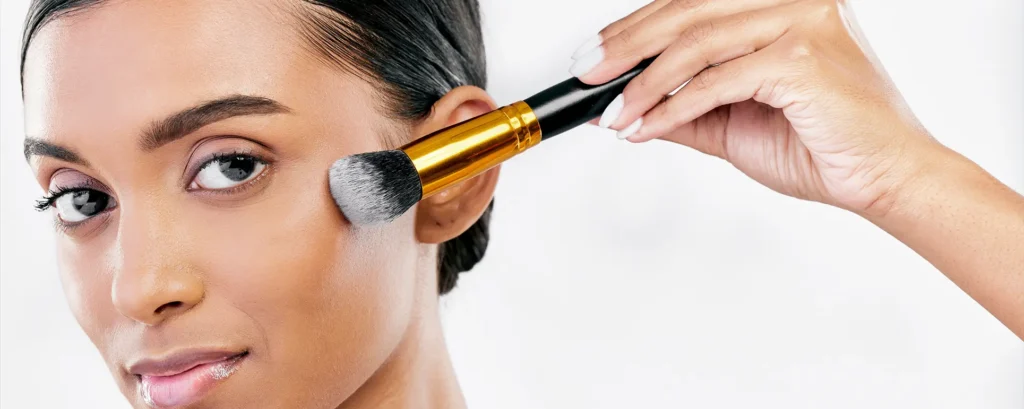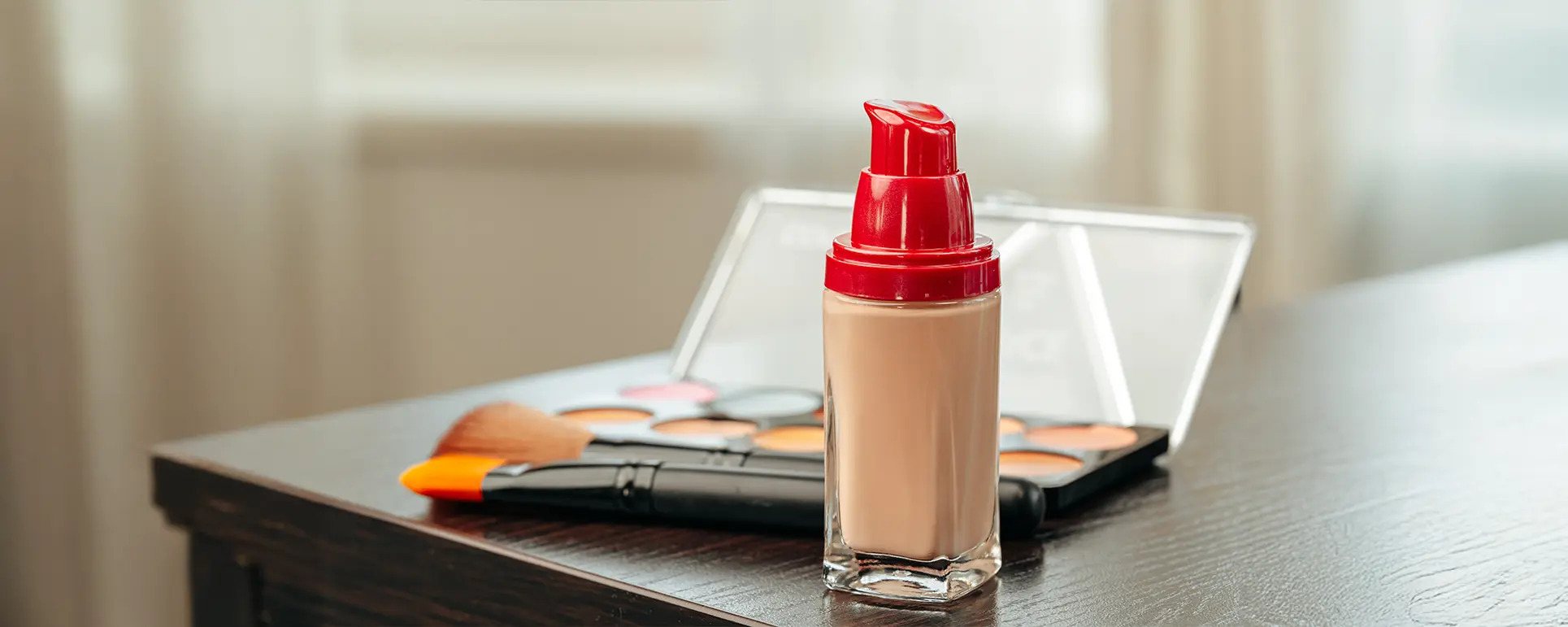Makeup is a staple in many people’s daily routines, and foundation, in particular, can give you that smooth, even complexion you love. But if you’ve ever noticed pimples, blackheads, or that frustrating feeling of congestion after putting it on, you’re not alone. Even when you choose products labelled non-comedogenic, your skin can sometimes react in ways you didn’t expect.
You might wonder, “Why does foundation always seem to clog my pores?” The truth is, there’s rarely a single culprit. A mix of factors your skin type, the ingredients in your foundation, how you apply it, and even your overall skincare habits can all play a role.
In this guide, I’ll walk you through everything you need to know. You’ll learn why certain foundations might be blocking your pores, which ingredients are more likely to cause trouble, and practical, dermatologist-approved tips for applying and removing your makeup. Plus, I’ll share advice on choosing products that help your skin stay clear, radiant, and healthy, so you can enjoy your makeup routine without worrying about breakouts.
How Foundation Can Clog Your Pores
Foundation can clog your pores in a few different ways, even if you think you’re choosing the right products.
Ingredient occlusion: Some foundations contain thick oils, silicones, or heavy pigments that create a barrier on your skin. While this helps your makeup look smooth and last longer, it can also trap sebum, dead skin cells, and environmental debris in your pores, leading to congestion and breakouts.
Product accumulation: If you’re layering multiple makeup products like primer, foundation, and powder without thoroughly cleansing at the end of the day, residue can build up over time. This buildup can block your pores and leave your skin feeling heavy or congested.
Interaction with sweat and natural oils: Your skin produces oils throughout the day, and on oily or combination skin, foundation can mix with these oils. This combination can thicken inside your pores, increasing the likelihood of breakouts or blackheads forming.
Even foundations labelled non-comedogenic aren’t foolproof. If you apply too much, skip cleansing, or have a sensitivity to a particular ingredient, your pores can still become clogged. Understanding these mechanisms can help you make smarter choices about which products to use and how to apply them, so you can enjoy a flawless finish without compromising your skin’s health.
Common Ingredients That Can Contribute to Pore Blockage

Not all foundations are created equal, and some ingredients are more likely to cause congestion than others. Knowing what to look out for can help you choose a formula that works with your skin instead of against it.
1. Heavy Oils
Ingredients like mineral oil, coconut oil, and certain plant-based oils can feel deeply nourishing, but they also have a tendency to trap sebum and dead skin cells in your pores. If you have oily or combination skin, these oils can make breakouts more likely, especially with frequent use.
2. Silicones
Dimethicone, cyclopentasiloxane, and other silicone-based ingredients are common in foundations because they give a silky, smooth finish. While they make your makeup glide on easily and last longer, they can form a lightweight film over your skin that prevents your pores from “breathing,” which may lead to congestion over time.
3. Thick Waxes and Dense Pigments
Some foundations rely on a high wax content or very dense pigments to achieve full coverage. While this can give you a flawless finish, these formulas can sit on the skin’s surface, trapping dirt, sweat, and oils, which increases the risk of blocked pores.
4. Certain Alcohols
Not all alcohols are bad, but denatured alcohols in some foundations and primers can dry out your skin. This might feel refreshing initially, but your skin often reacts by producing more oil to compensate, which can contribute to pore blockage and breakouts.
By understanding these common culprits, you can make smarter choices for your skin type. Look for lighter oils, breathable formulas, and non-irritating ingredients if you’re prone to congestion. The right product, applied thoughtfully, can give you a smooth, healthy finish without causing the issues you’re trying to avoid.
How Your Skin Type Affects Foundation Reactions
Your skin type plays a big role in how your foundation behaves and whether it might clog your pores. Understanding your unique skin needs can help you choose the right products and application methods, so you can enjoy a flawless look without compromising skin health.
1. Oily Skin
If your skin tends to get shiny or greasy throughout the day, you’re more prone to clogged pores because of excess sebum. When foundation mixes with this natural oil, it can thicken inside your pores and trigger breakouts or blackheads. To reduce the risk, look for lightweight, oil-free, or water-based foundations.
2. Dry Skin
Dry skin produces less oil, so clogged pores might not be your main concern. However, thick or heavy foundations can sit on the surface, emphasizing flakes and causing buildup over time. Hydrating, non-occlusive foundations those that moisturize without blocking pores work best here.
3. Combination Skin
Combination skin can be a bit trickier because different areas of your face behave differently. Your T-zone (forehead, nose, and chin) may get oily, while your cheeks and other areas remain dry. In this case, a targeted approach works best: use matte or oil-absorbing formulas in oily zones and hydrating, lightweight foundations on drier areas.
By understanding your skin type, you can make smarter choices about which foundations and products will give you the finish you want without causing congestion. Paying attention to these details can keep your skin looking healthy, clear, and radiant while still letting you enjoy your makeup routine.
Application Techniques That Reduce Pore Clogging

Even with the right foundation, improper application can lead to breakouts. Dermatologists recommend:
1. Clean Brushes and Sponges
- Bacteria and old product residue on applicators can contribute to clogged pores.
- Wash brushes at least once a week and replace sponges regularly.
2. Light Layers
- Applying thin layers reduces product buildup and allows skin to breathe.
- Build coverage gradually instead of applying a thick coat at once.
3. Avoid Touching Your Face
- Fingers can transfer oil, dirt, and bacteria to the skin.
- Use clean brushes or tools to blend foundation.
4. Prep Your Skin Properly
- Apply a lightweight primer or moisturiser to create a smooth base.
- Avoid heavy creams under foundation if your skin is prone to congestion.
The Role of Skincare in Preventing Clogged Pores
Taking care of your skin is just as important as picking the right foundation. Even the lightest, non-comedogenic formula can cause congestion if your skincare routine isn’t supporting your skin’s natural balance. By following a few key steps, you can help keep your pores clear and your skin healthy while still enjoying your makeup.
Cleanse daily
Make it a habit to remove all makeup, dirt, and excess oil at the end of each day. If you skip this step, foundation residue can mix with sebum and environmental debris, creating the perfect environment for clogged pores. Double cleansing using an oil-based cleanser first, followed by a gentle water-based one can be especially effective if you wear full-coverage foundation.
Exfoliate weekly
Dead skin cells naturally build up on your face, and when they mix with foundation, they can block your pores. Using a gentle exfoliant once or twice a week helps sweep away these cells, allowing your foundation to sit smoothly and preventing congestion. Look for chemical exfoliants like AHAs or BHAs if you have sensitive or acne-prone skin, as they’re often less abrasive than physical scrubs.
Use non-comedogenic moisturisers
Hydration is key for every skin type. Even if you have oily skin, skipping moisturizer can cause your skin to overcompensate by producing more oil, which increases the risk of clogged pores. Choose lightweight, non-comedogenic formulas that keep your skin balanced without adding extra heaviness.
Consider targeted treatments
If your skin is prone to breakouts, incorporating products with salicylic acid, niacinamide, or retinoids can help reduce pore blockage. These ingredients work to unclog pores, regulate oil production, and encourage healthy cell turnover, giving your skin a clearer canvas for makeup.
By combining consistent skincare with the right foundation formula and application habits, you’ll give your skin the best chance to stay clear, healthy, and radiant. When you treat your skin well, you can enjoy your makeup routine without worrying about congestion or breakouts.
Common Misconceptions About Non-Comedogenic Makeup
- Label doesn’t guarantee pore safety: Non-comedogenic products are formulated to minimize blockage but may still trigger reactions in sensitive individuals.
- More expensive doesn’t mean better: Premium foundations can still clog pores if the formula isn’t compatible with your skin.
- All-natural doesn’t mean non-comedogenic: Plant-based oils or butters can still cause congestion in susceptible skin types.
Understanding these points helps you make informed choices and reduce the risk of breakouts.
How to Choose the Right Foundation for Your Skin
Choosing a foundation that works with your skin not against it can make a huge difference in preventing clogged pores and breakouts. Here’s how you can make the best choice for your unique skin needs.
Check the ingredient list
Before you buy, take a moment to look at the ingredients. If your skin is prone to congestion, it’s best to avoid heavy oils, thick waxes, or occlusive silicones, which can trap sebum and dead skin cells in your pores. Instead, look for lightweight, breathable ingredients that give coverage without creating a barrier over your skin.
Select based on your skin type
Your skin type should guide your foundation choice. If you have oily skin, opt for oil-free, matte, or water-based formulas that help control shine. Dry skin benefits from hydrating, non-occlusive foundations that prevent flaking. For combination skin, you might need to use different formulas on different areas or choose a balanced product that addresses both oily and dry zones.
Test before full application
Patch testing can save you from surprises. Apply a small amount on your jawline or wrist first and wait 24 hours to see how your skin reacts. This can help you avoid irritation, clogged pores, or breakouts before you put foundation all over your face.
Consider mineral or water-based foundations
Mineral and water-based foundations are usually lighter and less likely to block pores. They provide natural coverage and allow your skin to breathe, making them a great choice if you’re worried about congestion or have sensitive skin.
By paying attention to ingredients, matching your foundation to your skin type, testing new products, and choosing lighter formulas when possible, you can enjoy a smooth, even finish without compromising your skin’s health. The right foundation should enhance your complexion, not cause extra problems.
Removing Foundation Properly
Taking off your foundation at the end of the day is just as important as applying it correctly. If you leave makeup on, even the lightest formulas can mix with oil and dirt, leading to clogged pores and breakouts. Here’s how you can make sure your skin stays clean and healthy.
Double cleanse
Start with an oil-based cleanser to gently dissolve makeup, sunscreen, and impurities. Even waterproof or long-wear foundations can be broken down this way. Then follow with a gentle foaming or cream cleanser to remove any leftover residue, ensuring your pores are truly clean without stripping your skin.
Use micellar water for sensitive areas
The skin around your eyes and lips is delicate, so it’s best to use micellar water or a gentle makeup remover there. This helps lift makeup without tugging or irritating these sensitive areas, reducing the risk of redness or inflammation.
Avoid harsh scrubbing
Scrubbing your skin with a rough cloth or excessive pressure might feel like it’s getting rid of everything, but it can actually irritate your skin and make breakouts worse. Instead, use soft hands or a gentle cleansing tool in circular motions to remove makeup without causing damage.
Moisturise after cleansing
Once your skin is clean, apply a lightweight, non-comedogenic moisturizer to restore hydration and balance. This helps maintain your skin barrier, preventing dryness or overproduction of oil, which can contribute to clogged pores.
By following these steps, you’re giving your skin the best chance to stay clear, comfortable, and healthy. Proper makeup removal isn’t just about cleanliness it’s about protecting your pores, reducing breakouts, and setting a strong foundation for your skincare routine.
When to Consult a Dermatologist
If you still experience breakouts or clogged pores despite proper foundation and skincare:
- A dermatologist can identify underlying causes, such as hormonal acne or sensitivities.
- They can recommend treatment options and personalised advice for makeup choices.
- Professional guidance ensures long-term skin health while allowing you to enjoy cosmetics safely.
Frequently Asked Questions About Foundation and Pores:
1. Why does my foundation always seem to clog my pores?
Foundation can clog your pores for a few reasons. Ingredients like heavy oils, silicones, or thick pigments can create a barrier on your skin, trapping sebum, dead skin cells, and environmental debris. Even when using non-comedogenic products, excessive layering, improper removal, or sensitivity to certain ingredients can cause congestion. Your skin type also plays a role, as oily areas are more prone to blocked pores than dry areas.
2. Are non-comedogenic foundations completely safe for preventing breakouts?
Non-comedogenic foundations are formulated to reduce the likelihood of pore blockage, but they aren’t a guarantee. Your skin might still react to certain ingredients, and improper application or removal can lead to congestion. Paying attention to how your skin responds and adjusting your routine accordingly is key.
3. Can foundation cause acne even if I have dry skin?
Yes, foundation can contribute to acne even if your skin is dry. Thick, heavy formulas can sit on the surface and mix with any natural oils or dead skin cells, creating a breeding ground for clogged pores. Choosing hydrating, lightweight formulas and exfoliating regularly can help prevent this.
4. How can I tell which foundation ingredients are causing breakouts?
If you notice repeated breakouts after using certain foundations, it’s helpful to check the ingredient list. Heavy oils, dense waxes, silicones, and certain alcohols are common culprits. Patch testing a new product on your jawline or wrist before full application can help you identify any reactions.
5. Does layering multiple makeup products increase the risk of clogged pores?
Yes, layering multiple products can lead to buildup if you don’t cleanse properly. Each layer can trap oil, dirt, and previous makeup, which may block your pores. Using light layers, applying products thoughtfully, and thoroughly removing makeup at the end of the day are essential practices.
6. Are mineral or water-based foundations better for sensitive or acne-prone skin?
Mineral and water-based foundations are generally lighter and more breathable, which can reduce the risk of pore congestion. They allow your skin to “breathe” while providing coverage, making them a suitable option if you have sensitive or acne-prone skin. However, individual reactions can still vary, so testing new formulas is important.
7. Can improper cleansing worsen clogged pores from foundation?
Absolutely. Leaving foundation on overnight or skipping proper cleansing allows makeup, oil, and debris to accumulate in your pores. Double cleansing, starting with an oil-based cleanser followed by a gentle foaming or cream cleanser, helps ensure your pores are thoroughly cleaned.
8. Should I avoid foundation entirely if I’m prone to breakouts?
You don’t necessarily have to skip foundation entirely. By choosing formulas that match your skin type, avoiding pore-clogging ingredients, using light layers, and following a consistent skincare routine, you can enjoy makeup without triggering breakouts. It’s more about how you apply and remove it than avoiding it completely.
9. How often should I replace makeup tools to prevent clogged pores?
Makeup tools like brushes and sponges can harbor bacteria and residue, which can contribute to clogged pores. Washing brushes at least once a week and replacing sponges regularly helps keep your skin clear and reduces the risk of breakouts.
10. When should I consult a dermatologist about foundation-related breakouts?
If you continue experiencing clogged pores or breakouts despite following proper skincare and foundation practices, it’s a good idea to consult a dermatologist. They can identify underlying issues, such as hormonal acne or sensitivities, and provide tailored treatment options and makeup guidance to keep your skin healthy while allowing you to enjoy cosmetics safely.
Final Thoughts: Keeping Your Pores Clear While Using Foundation
Wearing foundation doesn’t have to mean clogged pores or breakouts. By choosing the right formula for your skin type, applying it in light layers, and making sure you remove it properly every day, you can enjoy a flawless finish without compromising your skin’s health. If you’re unsure which products are best for you or how to adjust your routine, speaking with our dermatologist at the London Dermatology Centre can help. They can guide you on makeup choices and skincare habits so you can feel confident and keep your skin looking clear, healthy, and radiant.
References:
1. Lee, S., et al. (2024). Study Explores Cons of Wearing Make-up During Exercise. Texas A&M University-San Antonio. Available at: https://news.tamusa.edu/2024/03/Study-Explores-Cons-of-Wearing-Make-up-During-Exercise.html
2. Chang, K. (2016). Acne and Makeup: What You Should Know. Baylor College of Medicine. Available at: https://blogs.bcm.edu/2016/07/22/acne-and-makeup-what-you-should-know/
3. Katta, R. (2020). Avoid Face Irritation, Acne While Wearing Masks. Baylor College of Medicine. Available at: https://www.bcm.edu/news/avoid-face-irritation-acne-while-wearing-masks
4. Que-Hee, S. (2018). Is Cheap Makeup Bad for Your Skin Health? UCLA Fielding School of Public Health. Available at: https://coeh.ph.ucla.edu/2018/08/21/is-cheap-makeup-bad-for-your-skin-health-coehs-shane-que-hee-weighs-in/
5. Lee, S., et al. (2016). The Relationship Between the Use of Cosmetics and the Occurrence of Acne Vulgaris in Female Medical Students. Academia.edu. Available at: https://www.academia.edu/123777372/The_relationship_between_the_use_of_cosmetics_and_the_occurrence_of_acne_vulgaris_in_female_medical_students_at_the_faculty_of_medicine_UKI_in_the_year_2016
